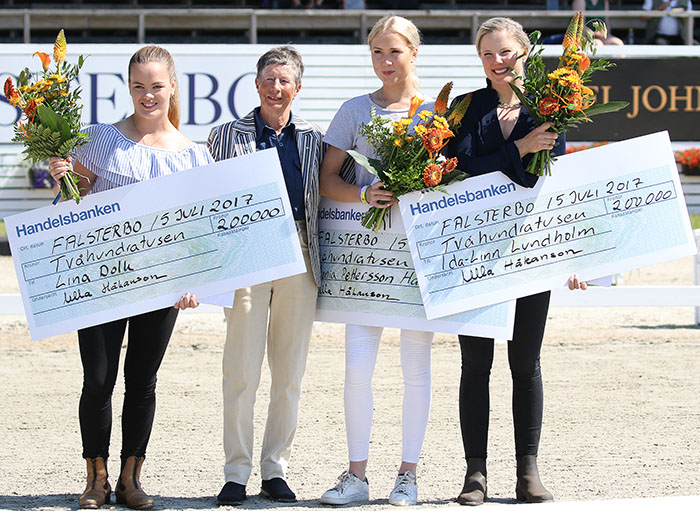From Jumping Champion to Dressage Medalist at 1st Olympics in 1972, Sweden’s Ulla Håkanson Still Competing Near 80th Birthday
8 years ago StraightArrow Comments Off on From Jumping Champion to Dressage Medalist at 1st Olympics in 1972, Sweden’s Ulla Håkanson Still Competing Near 80th Birthday

By KENNETH J. BRADDICK
FALSTERBO, Sweden, July 17, 2017–When Ulla Håkanson rode her Richelle in this year’s Falsterbo Horse Show CDI3* she was adding to her accomplishments as probably the world’s oldest international dressage competitor four months shy of her 80th birthday after four Olympics and a slew of championships.
Ulla has had a remarkable career, from taking Ajax on which she was the first woman to win the Nordic Baltic individual jumping championship in 1967, to Munich to win dressage team bronze at the 1972 Olympics that was the first of her four Games.
While her competition schedule is nothing like as intense as it was for four decades of top competition, Ulla is active, vibrant and still able to laugh at herself.
What hasn’t changed is her love of horses and horsemastership.
She and her former cavalry officer husband ride two horses a day and she dedicates a big slice of her time to supporting horse sports in Sweden. Raising money to provide scholarships to youth dressage and jumper riders each year and donation of a permanent main grand stand at Falsterbo’s dressage competition arena are among her efforts.
Not surprisingly, she has strong opinions gained over a lifetime with horses –highly complimentary of the quality of dressage horses being bred but not so much of the training and development. She has similar opinions about many young riders where over-indulgent parents don’t want their children taking time to groom, tack up and care for their horses that she believes are essential to building a lifelong partnership.

Ulla was first on the back of a horse at three years old, sitting on a cushion on the saddle. That developed to where she would sit in the saddle while her father, a cavalry officer, would lead from his bicycle–but, she laughs as she recalls, “sometimes I wasn’t there. I was in the ditch. No, it didn’t stop me. That was the challenge, to stay on.”
Then her father acquired Ajax, a four-year-old Swedish-bred horse, for Ulla to develop as a jumper.
She also rode dressage and at horse shows would compete Ajax in dressage in the morning and jumping in the afternoon until the horse reached a high enough level of jumping that she skipped dressage.
In the 1960s, when equestrian like most sports were dominated by men, she and Ajax became so successful that the pair were selected for Sweden’s jumping team for the 1967 Nordic Baltic Championships. After winning Nations Cup gold, Ulla and Ajax went on to become the first female individual champions.
World championships followed in 1970, then a year later the Europeans.
At the Olympics in Munich in 1972, the pair won team bronze.
Though 19 years old in 1976, Ajax made his first air flight to go as an individual to the Montreal Games. But the horse became ill the day after arriving of what was determined to be a stomach tumor and died in Canada.
Ulla’s career took her to the Los Angeles Olympics in 1984 for another team bronze, to Seoul in 1988 and Atlanta in 1996. She also went to six world championships and 10 Europeans over three decades.
Despite her lengthy competition tenure, Ulla said she has not had “so very many horses because my horses get quite old. I am not riding in the square every day. I am riding outdoors in the fields, the woods every day. That, I think, makes the horses more happy.”
Richelle, the Rhinelander mare she showed in the Falsterbo CDI3* this year, is 18 years old and that Ulla has competed at Big Tour since 2010. She and her husband, who no longer competes, each ride two horses daily.
“It’s fun,” she said. “I like it and it’s good to ride to keep yourself healthy.”
Most times she tacks up her own horses and drives her own truck to horse shows.
She is also into judo (“you learn how to fall”) and line dancing.
The things that have been her life with horses are too often missing from the lives of many young equestrians today.
“For the dressage horse the nicest was when I could take a little jump after the dressage,” she said, “but they have skipped that now. Why? I think a young rider and a young horse they should do everything–they should jump, they should do dressage, they should do everything.”
Ulla thinks competition horses are “much nicer these days, looking much nicer, moving nicely, but unfortunately we have too few people who can take care of those super horses.”
And horses are being competed too young, in her view.
“They think they can do everything when the horses are four or five years old. But I think that is too early to do a lot of things. They should wait until they are six or seven years old to perform, especially the big horses.”
If there’s one thing she would like to instill into dressage riders it is to jump their horses.
“I can’t imagine why not,” she said. “The young horses have to do something fun. If the riders don’t dare to jump themselves they can free jump the horses. It’s good gymnastics for every horse.
“Young riders have to do something different, not going around 10 times here and 10 times there. That is too boring, it is nothing for a horse.”
How much longer will she ride? A question she has been asked often in the past 30 years.
“If I’m fit I should keep riding.
“I know I’m not the winner here, but I think it’s nice to have the chance to participate with my horse.”

